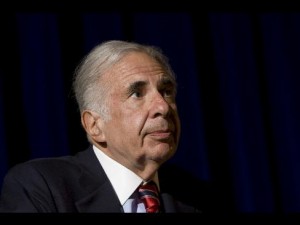As protests against Carl Icahn spilled over into New York City, his casino CEO, Anthony Rodio, sent ominously mixed signals about the future of Trump Taj Mahal. On the one hand, he offered a partial restoration of health benefits and a reduction in the  room-cleaning quota to 14 rooms a day (the Atlantic City standard). On the other, he called the Taj “a money pit,” raising questions about the depth of his and Icahn’s commitment to the property. “The company offered to fund a health insurance plan that was offered by Unite-Here but was not quite as rich as the plan at the other A.C. casinos. But it did provide medical insurance for all union members and their families. In addition, the Taj Mahal would have extended health insurance to all non-union members, as well. This one concession would have cost the company multiple millions of dollars,” he also offered to renegotiate terms in 18 months, as well as that new job openings would be coming on line. However, he also said his deal was only valid through end of business Monday, raising the specter of a bare-bones follow-up offer.
room-cleaning quota to 14 rooms a day (the Atlantic City standard). On the other, he called the Taj “a money pit,” raising questions about the depth of his and Icahn’s commitment to the property. “The company offered to fund a health insurance plan that was offered by Unite-Here but was not quite as rich as the plan at the other A.C. casinos. But it did provide medical insurance for all union members and their families. In addition, the Taj Mahal would have extended health insurance to all non-union members, as well. This one concession would have cost the company multiple millions of dollars,” he also offered to renegotiate terms in 18 months, as well as that new job openings would be coming on line. However, he also said his deal was only valid through end of business Monday, raising the specter of a bare-bones follow-up offer.
Rodio’s rhetoric didn’t impress Unite-Here Local 54, which responded with some of its own, accusing Icahn and Donald Trump of looting the Taj’s coffers of money that could have gone to benefits and maintenance. (An unfair slam on Icahn, we think.) Referencing an out-of-date job offer of treasury secretary in a Trump administration, Local 54’s Ben Begleiter said, “Trump thinks Icahn should  be running America’s economy. If that happens, then all of America’s workers are in trouble.” Local 54 President Robert McDevitt was more on point, saying, “This company offered them health insurance that was essentially half of what every other property agreed to, including the Taj’s sister casino [the Tropicana Atlantic City]. These workers want to know why it is OK for Trop workers to be able to go to the doctor, but not them?” Indeed, that’s the question to which Rodio has failed to provide an adequate answer — indeed no answer at all.
be running America’s economy. If that happens, then all of America’s workers are in trouble.” Local 54 President Robert McDevitt was more on point, saying, “This company offered them health insurance that was essentially half of what every other property agreed to, including the Taj’s sister casino [the Tropicana Atlantic City]. These workers want to know why it is OK for Trop workers to be able to go to the doctor, but not them?” Indeed, that’s the question to which Rodio has failed to provide an adequate answer — indeed no answer at all.
Meanwhile, things couldn’t have gone smoother for MGM Resorts International, which received unanimous approval from the New Jersey Casino Control Commission to purchase Borgata. You’d never have thought MGM and the NJCCC had once been at odds. Now MGM CEO Jim Murren gets to sit down and write out a $900 million check to Boyd Gaming for its half of the property. Considering that Boyd is going to be considerably more exposed in the Las Vegas market — and no longer has its East Coast cash cow — it’ll need the dough.
* Like a mirage, the reopening of the Cal-Neva Lodge & Casino keeps receding into the distance. Now owner Criswell-Radovan has filed for bankruptcy, putting the project on hold. Although it had planned to open a revamped hotel tower and casino floor, the project has seen delay after delay. The owners are $27 million in hock to their creditors, including lead contractor Penta Building. Luckily for Criswell-Radovan, its construction permit doesn’t expire until October of next year, leaving it plenty of time to get the Cal-Neva renovation finished once the company has its finances in order.
* I can well remember when Treasure Island Resort & Casino, near Red Wing, Minnesota, was little more than a glorified quonset hut. Now it’s grown to a destination casino-hotel with a new, $19 million water park that’s so successful that it’s already slated for expansion. Treasure Island is also adding two hotel towers, with a combined total of 300 rooms and suites. But it was the Lagoon Water Park & Wave Spa that was the real game-changer. “It has been beyond our expectations as far as popularity,” said Prairie Island Indian Community spokeswoman Cindy Taube, forcing the issue of the tripling of the hotel quotient.
* Opponents of gambling expansion in Nebraska aren’t blushing to use race-baiting verbiage to make their point. “We’ve subsidized the Indians for hundreds of years. There’s tremendous poverty on the reservation, there’s alcoholism, there’s a lot of things where – that’s where they’ve chosen to stay, and that’s what the result was,” said Gambling With the Good Life mouthpiece Pat Loontjer, an old battleaxe enthusiastically wielding the tar brush. On the other side, Ho-Chunk Inc. CEO Lance Morgan stresses the economic benefits that tribal gaming has spawned. “Before, we used to have ‘Indian cars,’ [which had] only has a couple of gears, no back window, and all beat up, old cars. Now, everybody’s driving nice cars. Almost everybody is living in good housing,” he said in riposte to Loontjer’s White Man’s Burden argumentation.
If Morgan has his way at the polls this November, Nebraskans will vote to expand gambling to six racetracks in the state, one of which is owned by Winnebago Indian Tribe. The latter’s has parlayed $9 million in revenue from its WinnaVegas casino in Iowa into a $117 million corporate enterprise, one that’s plowing over a million dollars into the election. Said Morgan, “It’s more economic activity, more jobs, more everything. We’re dealing with six, seven generations of poverty and pulling out of that is expensive and takes effort.” And how in any way is this a “subsidy” in a free market? While S&G sides with the Winnebago in this race, if Gambling With the Good Life wants to win, it should tape Pat Loontjer’s mouth shut until after Election Day.
* If you want some retail therapy, go to Macao. There, Galaxy Entertainment is thanking heavy shoppers with free hotel stays that formerly when to high rollers. After all, the shoppers are more high-profit-margin customers.

